This week in TV Guide: August 9, 1958
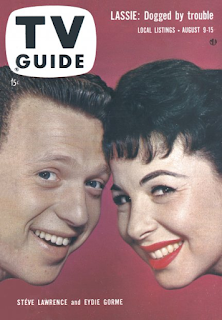 During this week's cover story interview, the unnamed TV Guide writer asks Steve Lawrence about the plans he and his wife, Eydie Gormé, have for the future. "We want to be sort of timeless," Steve replies, "like Sinatra or Doris Day or Dinah Shore—the standouts, not the flashes-in-the-pan. We're building slowly and we may not make the big money all at once. But we think we have a solid foundation and that'st he way we're going to play it." As the subhead puts it, they're "building careers slowly because they want applause to last."
During this week's cover story interview, the unnamed TV Guide writer asks Steve Lawrence about the plans he and his wife, Eydie Gormé, have for the future. "We want to be sort of timeless," Steve replies, "like Sinatra or Doris Day or Dinah Shore—the standouts, not the flashes-in-the-pan. We're building slowly and we may not make the big money all at once. But we think we have a solid foundation and that'st he way we're going to play it." As the subhead puts it, they're "building careers slowly because they want applause to last."After having looked through a few hundred issues of TV Guide, covering four decades, you get used to reading stories about starlets who never become the next big thing, big stars who are forgotten today, stars whose whitewashed profiles hid dark secrets, solid marriages that break up a year or two later. What you don't often get are stories that pretty much tell you exactly who people are and what the future has in store for them—but that's exactly what we have here.
Now, I didn't know either of them personally; they could have been horrible people. But they never came off that way on TV, and they don't come off like that here. Steve and Eydie started as singers on The Steve Allen Show in 1954. They married in 1957, and this summer they're subbing for Allen with their own show. They had other opportunities, Lawrence says, but "we picked this one because it offered us more of a good showcase." As for future TV efforts, he says that "A weekly series, unless it's right, can do more harm than good professionally. We've had offers. Plenty of them. But we haven't found the right format." When they're out on the road, it's generally with one of them as a single, rather than the two of them together. It's true, Lawrence points out, that they make more money as soloists than as an act—but they prefer "to take different jobs at different times. Then we can always be together." Indeed, when asked if she would take a job in Hollywood while Lawrence was performing in New York, Gormé says she wouldn't. "Maybe it wouldn't hurt our marriage, but it would hurt me. I can't stand to be that far away from Stevie."
That was Steve and Eydie in 1958, and, it seems to me, that was them all throughout their career. When Lawrence talks about wanting to be timeless, when he throws out names like Sinatra and Day, you're tempted to thing this might be a bit presumptuous for someone who's all of 23 (unless his name is, say, Paul Anka), but by the time Eydie retires in 2010, the couple have been stars, separately and together, for 53 years. They're regulars in nightclubs and on television; they appear on almost every variety show; they're frequently guests on The Tonight Show with Johnny Carson (on consecutive nights, so that one of them will always be with their children while the other is performing); they do specials of their own, for which they win Emmys; they release successful albums, both separately and together. Steve's big hit is, "Go Away, Little Girl," and turns out to be not just a very good singer, but a fine actor in both comedies and drama, nominated for a Tony for What Makes Sammy Run? Eydie has a big hit of her own with "Blame it on the Bossa Nova," and has another success with "Amor." Their marriage, which seems so ideal in TV Guide, is the first for each of them, and lasts until Gormé's death in 2013. Lawrence continues to perform, despite an Alzheimer's diagnosis earlier this year. Yes, I'd say the applause lasted a good long time for them.
t t t
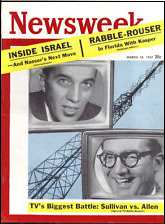 Starting in 1954, Steve Allen helmed his own NBC variety show which, at the beginning, aired opposite that of Ed Sullivan. It didn't run as long as Ed's, of course, but then Allen said his goal was never to conquer Ed, just to coexist with him, which he did for several seasons. Let's see who gets the best of the contest this week. (With the aforementioned Steve Lawrence and Eydie Gormé filling in for Steverino.)
Starting in 1954, Steve Allen helmed his own NBC variety show which, at the beginning, aired opposite that of Ed Sullivan. It didn't run as long as Ed's, of course, but then Allen said his goal was never to conquer Ed, just to coexist with him, which he did for several seasons. Let's see who gets the best of the contest this week. (With the aforementioned Steve Lawrence and Eydie Gormé filling in for Steverino.)Sullivan: Ed's guests tonight are winners of the Fifth Annual U.S. Navy World Wide Talent Contest.
Lawrence and Gormé: Steve and Eydie's guests are musical-comedy star Janis Page, singer Julius La Rosa, Jazzman Lionel Hampton and the Compass Players, comedy acting group.
If we lived inside the world of television, rather than on the outside looking in, the Navy Talent Contest participants would include someone we recognize from one of our sitcoms. Change "Navy" to "Army," for example, and it would be a perfect scenario for The Phil Silvers Show, with Bilko conniving to get someone, probably Doberman, on the show by passing him of as a singer of Italian opera (with Bilko as his manager, of course), all as an excuse to get to New York where Bilko can introduce himself to some beautiful French actress. For all I know, they did do a story like this.
However, as I said, we don't live inside that world, and so we make do with what we have. Undoubtedly, the hit of the Sullivan show this week has to be the U.S. Navy Steel Band , which was able to get into the show due to a last-minute cancellation; this excerpt from a book about the history of the band captures their appearance on the show. The band, formed in 1957, has quite a history; as the Wikipedia entry notes, "Between 1973 and 1979 alone the band traveled over a million and a half miles, and performed as many as 500 concerts a year." They also released several albums before they were finally disbanded in 1999. You can listen to one of these albums here, and believe me, you've never heard "The Stars and Stripes Forever" until you've heard it performed by a steel drum band.
Have I overlooked anything? Right, the matchup. Well, as unpatriotic as it may seem, I'm afraid even the U.S. Navy Steel Band can't compete with Lionel Hampton, not to mention Janis Page and Julius La Rosa. As the stars of this week's cover, it's appropriate that Steve and Eydie take the prize.
t t t
We've had a lot of fun with letters to the editor over the years, but this is one of the rare cases where the letters are regional, rather than national. (Address: Regional Editor, TV Guide, Cleveland 14, Ohio.) I could be reading too much into these, but I'm struck again by how, well, regional this country used to be, before we were linked by social media and our obsessive national culture.
Take a letter about a "new" star that isn't so "new," John Raitt of The Chevy Show. What else, the writer asks (apparently in all innocence), has he done? Well, John Raitt's appeared in a few musicals you might have heard of, including The Pajama Game (reprising his role in the movie version, opposite Doris Day), Annie Get Your Gun, and most recently, Carousel. (He's also partly responsible for a daughter named Bonnie , but I don't blame anyone for not caring about that yet.) John Raitt's a big star on Broadway. But, in Cleveland in 1958, it's possible you might not have heard of him. I'm not talking down to Clevelanders here, only pointing out that this is before the Tony Awards became a television special, before it became more common to travel to a place like New York and catch a Broadway show or two. (This is also the year the Dodgers and Giants moved to California.) See what I mean?
One of the marvels of television in this era is how it brought the world to people who heretofore had only seen their little corner of it. The Pew Research Center reported in 2008 that in the Midwest, "nearly half of adult residents say they have spent their entire lives in their hometown." I don't know what the figures looked like back in 1958, but overall Pew reports that "the number of people who moved between 2007 and 2008 . . .was the lowest since 1959-60," so it's not improbable to think that Midwesterners were just as homebound back then. I always think back to the first episode of Edward R. Murrow's See It Now, in which he marveled at television's ability to show, on two separate screens, live pictures of the Atlantic and Pacific Oceans.
Ed Sullivan, in particular, was responsible for bringing a great deal of New York's entertainment scene to the rest of the country, of helping to create the "middlebrow" culture that enabled musical theater and opera stars to become household names. This clip of Raitt performing one of the signature songs from Carousel doesn't identify what TV show it was from, but it easily could have been Sullivan's.
That middlebrow culture has largely disappeared today, which is ironic considering that we're now, supposedly, more connected than ever. It's a different kind of connection though, one that's perhaps more superficial, more focused on the celebrity culture (often self-made), and it's more confrontational than educational. And if you were to have a similar letters to the editor section today, you'd likely have people asking who Ariana Grande is, or Cardi B., or Drake. In that sense, we're just as splintered, just as alone, as we were back in 1958.
Is this progress? Damned if I know.
t t t
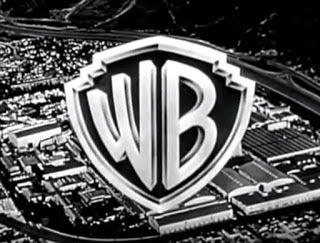 Another letter, which bears all the marks of having been written by a young fan, lauds Clint Walker of ABC's Cheyenne, who is "really good." Writes the fan, "he is my favorite actor and Western star [and] I thought I would write and tell you that I sincerely hope that this particular show will stay on TV for a long time." I hope, then, that this fan doesn't get too depressed over the note in TV Teletype that Ty Hardin will be taking over Cheyenne in the fall, playing the new role of Bronco Layne, due to the continuing contract dispute between Warner Bros. and Walker. It's no idle threat; Walker doesn't return to Cheyenne until next year, when it enters into a rotating format with Hardin's Bronco and Will Hutchins in Sugarfoot.
Another letter, which bears all the marks of having been written by a young fan, lauds Clint Walker of ABC's Cheyenne, who is "really good." Writes the fan, "he is my favorite actor and Western star [and] I thought I would write and tell you that I sincerely hope that this particular show will stay on TV for a long time." I hope, then, that this fan doesn't get too depressed over the note in TV Teletype that Ty Hardin will be taking over Cheyenne in the fall, playing the new role of Bronco Layne, due to the continuing contract dispute between Warner Bros. and Walker. It's no idle threat; Walker doesn't return to Cheyenne until next year, when it enters into a rotating format with Hardin's Bronco and Will Hutchins in Sugarfoot.Walker is far from the only WB star to run into contract problems with the studio. Probably the most famous of their disputes is with James Garner, who leaves Maverick after its third season because of the studio's refusal to pay him during a writers' strike; Edd Byrnes, during the second season of 77 Sunset Strip, takes a hike as well, dissatisfied with both his salary and the size of his role. Both Walker and Byrnes eventually settle their disagreements and return to their respective shows, but not Garner: he files suit against Warners for breach of contract and wins, then wins on appeal as well, making him essentially a free agent. It's a landmark case in the annals of Hollywood, and Garner goes on to even greater fame and fortune in a marvelous career.
(Wonderful thing about TV Guide; there's a rabbit hole around practically every corner.)
t t t
So what else have we got this week?
CBS's Saturday afternoon baseball game of the week between the Boston Red Sox and New York Yankees (1:40 p.m. ET) is preceded by the annual Old-Timers Day game, this year featuring members of the 1947 Yankees and 1946 Red Sox. One of the challenges here is that so many of the Yankees stars are still playing, including Yogi Berra, Mickey Mantle, Whitey Ford and Elston Howard. Joe DiMaggio's retired, though, and he'll be just one of the greats taking part.
Do I need to explain who Hume Cronyn was? Although he's most famous for his work on stage (and for being married to Jessica Tandy), he did plenty of television (including a couple of wonderful performances on Hawaii Five-O), and we have proof of this on Sunday. First, he co-stars with Eva Gabor in the G.E. Theater comedy "Ah, There, Beau Brimmel" (9:00 p.m., CBS), then he turns around and appears as a murderous barrister in "Impromptu Murder" on Alfred Hitchcock Presents (9:30 p.m., NBC). Not a bad night's work.
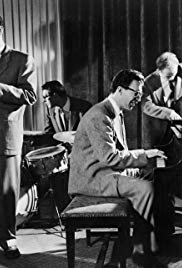 When you watch a lot of classic TV, you get to see people like Bobby Troup, musicians who were also very good character actors (usually, but not always, playing musicians). So if you only know Troup as Dr. Joe Early on Emergency!, you're missing one of the great jazz artists of all time. On Monday, his show, Stars of Jazz (ABC, 9:00 p.m.) features another all-time great: the Dave Brubeck Quartet (left), featuring Paul Desmond on the alto-sax.
When you watch a lot of classic TV, you get to see people like Bobby Troup, musicians who were also very good character actors (usually, but not always, playing musicians). So if you only know Troup as Dr. Joe Early on Emergency!, you're missing one of the great jazz artists of all time. On Monday, his show, Stars of Jazz (ABC, 9:00 p.m.) features another all-time great: the Dave Brubeck Quartet (left), featuring Paul Desmond on the alto-sax.Tuesday, the aforementioned Cheyenne (7:30 p.m., ABC) includes a guest star appearance by future soap icon (and mother of Corbin Bernsen) Jeanne Cooper, as Cheyenne struggles to recover from a desert ambush that leaves him with no horse, no food, and no water.
On Wednesday, the husband-and-wife team of Robert Sterling and Anne Jeffreys star in "The Julia Gage Story" on Wagon Train (7:30 p.m., ABC). And Thursday's Playhouse 90 presentation, "No Time at All," is a psychological story about a possibly-doomed airliner, with a cast including Bill Lundigan ( whom we read about a couple of weeks ago), Jane Greer, Betsy Palmer, Keenan Wynn, Reginald Gardiner, James Gleason, Jack Haley and Buster Keaton. They probably need all 90 minutes.
On Friday, ABC once again covers the College All-Star Game from Soldier Field in Chicago (9:30 p.m.), pitting the NFL champion Detroit Lions against a college all-star team boasting future Hall of Famers Bobby Mitchell, Jerry Kramer and Ray Nitschke, plus Alex Karras. Despite the Lions boasting six Hall of Famers of their own, including Bobby Layne and Joe Schmidt, the All-Stars explode for 20 points in the second quarter en route to a 35-19 humiliation of the Leos.
t t t
I could conclude with this week's starlet, none other than Shirley MacLaine, but instead I'd just like to say that this here issue has been brought to you by Bruce Speicher, who ran across it in his mother's possessions, and thoughtfully asked if I might like it. He's not sure why she saved it, although he notes that "she was a big fan of cartoonist Arnold Roth who is featured prominently in this issue." Ah, yes, Arnold Roth, who did so many hilarious cartoons for TV Guide over the years. Here are a couple of illustrations from this week's article on "famous lines" from The Late Show:
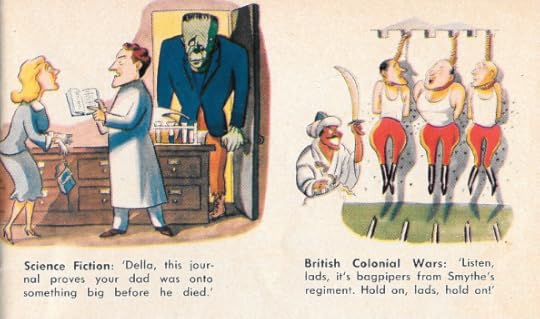
As you know, finances are not exactly plentiful at the moment, so if you'd like to donate an old issue for use in this weekly feature, or just loan it out for a couple of weeks (I'll return it in good shape!) shoot me an email. Thank you again, Bruce, and thanks to you all for your continued readership. TV
Published on August 10, 2019 05:00
No comments have been added yet.
It's About TV!
Insightful commentary on how classic TV shows mirrored and influenced American society, tracing the impact of iconic series on national identity, cultural change, and the challenges we face today.
- Mitchell Hadley's profile
- 5 followers



